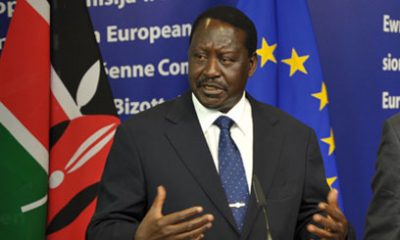By
Joe Khamisi
This week I took the trouble to obtain and read the report of the subcommittee on African Affairs of the US Senate on what transpired in Kenya in 2007/2008. Titled “The immediate and underlying causes and consequences of Kenya’s flawed election,” the report is based on the hearings that took place on 7 February 2008 before the subcommittee which is a branch of the powerful Committee on Foreign Relations.
I had two reasons why I wanted to revisit that horrible experience that took place nine years ago following the disputed 2007 general elections. One was to reacquaint myself with the feelings of the American leadership during that tragic period in our country’s history. And two was to see whether Kenyans have heeded any of the advices given by our friends.
The 115-page report contains written presentations from American political experts, academia and, more importantly Raila Odinga and, Kalonzo Musyoka who at that time was the vice president under Mwai Kibaki. The common threads running through the report are things we already know: flawed elections; delayed results; and the hastily-conducted Kibaki swearing-in ceremony. American legislators also talk of the loss of gains in the democratic progression; damage to Kenya’s economy; the fragile nature of the country’s ethnic composition; and what the US could do to stop future election violence. America is one of Kenya’s oldest and most strategic allies and a strong investment, financial and defence partner. What it says Kenya must listen.
In the subcommittee report, the Americans proposed several things Kenya needed to do to correct past mistakes including the development of effective governance institutions, creation of fair and equitable rules to govern political processes, respect for the rule of law; guarantees of adequate freedoms to civic organisations and the media; and freedom to allow citizens to organize themselves peacefully. Other than the successful adoption and implementation of the new constitution, the rest of the issues appear not to have been adequately addressed, hence the present volatile political atmosphere.
Failure to substantially fill the office of the Registrar of Political Parties has left political organisations free to do as they like further muddying an already unstable political climate. The rule of law is under threat, with extra-judicial assaults on innocent people becoming an almost daily occurrence. Peaceful protests are turning chaotic. People are dying and property is being damaged. Hate speech has become the new lingua franca of the political class with insinuations that point to extreme violence. Freedom of the press has been eroded and self-censorship – rather than objectivity – has become the norm in newsrooms. The personal security of journalists and bloggers can no longer be guaranteed, and reports have emerged suggesting that some of them are opting to carry arms for self-defence.
So, I find the advices given by the Americans to be as valid today as they were in 2008. They are no different from those made by the South African Judge, Johann Kriegler, who in 2008 called for “deep running electoral reforms.” The problem is that Kenyan leaders do not listen and do not want to learn from the past. They keep on repeating the same mistakes over and over again. What is happening in Kenya worries everyone. With the time running fast, people should not expect any more significant reforms to take place before the next elections. My prediction therefore is that the political landscape will deteriorate to dangerous levels as we get closer to the polls, and the consequences this time around will be more devastating than they were nine years ago.
That brings me to my question: What does Raila really want? Does he want the presidency to fulfil the dreams of his father; or, is he seeking the position for self-aggrandizement? Raila has been on the Kenya political scene since the 1970s. He has led many parties and held several cabinet positions. He contested the presidency three times and “failed.” As Prime Minister for five years he had an opportunity to implement his agenda of reforms. He didn’t and he couldn’t because the power-sharing arrangement with Kibaki was shaky and unworkable. Like Bernie Sanders, 74, the Democratic Party candidate in the US whose hopes of becoming the presidential candidate have faded, but refuses to quit, Raila 71, too wants to hang on until I don’t know when. As someone said, there is time for everything.
For the leader of the Orange Democratic Party, 2017 is crucial. If he loses he should leave active politics gracefully so as to preserve his legacy as a fierce and principled defender of democracy and human rights. If he wins he will have an opportunity of showing off his skills and Kenyans will get a chance to sample his presidency which has eluded him for so many years. However, the ruling elite must provide a level playing ground by ensuring the 2017 elections are conducted freely and fairly. Injecting barbarous tricks into the electoral system would hurt the country and damage Uhuru Kenyatta‘s reputation.
Joe Khamisi
Joe Khamisi is a former journalist, diplomat and Member of Parliament. He is also the Author of ‘Politics of Betrayal:Diary of a Kenyan Legislator‘, a political memoir about the situation in Kenya between 2001, when the ruling party of President Daniel Arap Moi, the Kenya African National Union (KANU), merged with Raila Odinga’s National Development Party.
The book also narrates cases of corruption in Parliament and in the Media and records Senator Obama’s visit to Kenya in 2006. As a friend of Barack Obama Senior, the author also remembers the times and tragedies of the American-educated economist.
Joe Khamisi’s second book, a biography, ‘Dash Before Dusk’ is also now on sale.
Joe’s latest book is ‘The Wretched Africans: A Study of Rabai and Freretown Slave Settlements‘ which has recently been published and is now available to purchase.






No Comments Yet!
You can be first to comment this post!